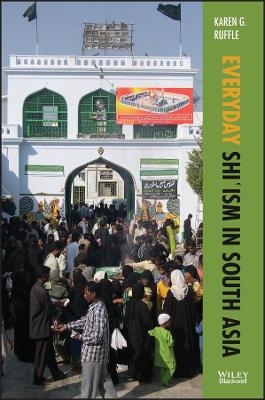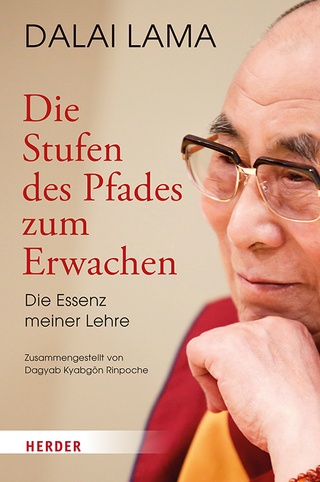
Everyday Shi'ism in South Asia
John Wiley & Sons Inc (Verlag)
978-1-119-35714-8 (ISBN)
Everyday Shi'ism in South Asia is an introduction to the everyday life and cultural memory of Shi’i women and men, focusing on the religious worlds of both individuals and communities at particular historical moments and places in the Indian subcontinent. Author Karen Ruffle draws upon an array primary sources, images, and ethnographic data to present topical case studies offering broad snapshots Shi'i life as well as microscopic analyses of ritual practices, material objects, architectural and artistic forms, and more.
Focusing exclusively on South Asian Shi'ism, an area mostly ignored by contemporary scholars who focus on the Arab lands of Iran and Iraq, the author shifts readers' analytical focus from the center of Islam to its periphery. Ruffle provides new perspectives on the diverse ways that the Shi'a intersect with not only South Asian religious culture and history, but also the wider Islamic humanistic tradition. Written for an academic audience, yet accessible to general readers, this unique resource:
Explores Shi’i religious practice and the relationship between religious normativity and everyday religious life and material culture
Contextualizes Muharram rituals, public performances, festivals, vow-making, and material objects and practices of South Asian Shi'a
Draws from author's studies and fieldwork throughout India and Pakistan, featuring numerous color photographs
Places Shi'i religious symbols, cultural values, and social systems in historical context
Includes an extended survey of scholarship on South Asian Shi’ism from the seventeenth century to the present
Everyday Shi'ism in South Asia is an important resource for scholars and students in disciplines including Islamic studies, South Asian studies, religious studies, anthropology, art history, material culture studies, history, and gender studies, and for English-speaking members of South Asian Shi'i communities.
Karen Ruffle, PhD, is Associate Professor in the Department of Historical Studies and the Study of Religion at the University of Toronto where she specializes in the study of South Asian Shi'ism. Her research and teaching interests focus on Shi'i devotional texts and ritual and material practices in South Asia. She is the author of Gender, Sainthood, and Everyday Practice in South Asian Shi'ism.
Acknowledgments xii
Transliteration Note xvi
Introduction 1
Everyday Shi'ism 6
Center and Periphery Reconsidered 8
The Hyper]visible "Invisible" Community 13
Redefining Norms: Shi'i/South Asia/Everyday 15
Representing Shi'ism 20
Contributions 31
The Scope of Everyday Shi'ism 32
References 34
Recommended Readings 38
Theoretical Lessons 38
1 South Asian "Lovers" of the Ahl-e Bait: Hindu and Non-Shi'i Muslim Traditions of Devotion 39
Muharram beyond Shi'ism: The "Composite Culture" of Commemorating Karbala in South Asia 40
The Husaini Brahmins: Hindu Devotees of Imam Husain 42
Pirla-Panduga: "The Festival of Pirs" among Hindus and Sunnis in South India 48
Devotion to Piru-Swami 51
Dulha! Dulha!: Sunni and Hindu Possession Rituals for the Bridegroom Qasem 56
The Shrine of Bibi Pak Daman in South Asian Muslim Cultural Memory 63
Conclusion 68
References 70
Recommended Readings 72
Theoretical Lessons 73
2 "Come, and Cry, Because 'Ashura Is Today": Shi'i Literary Aesthetics 74
Tears of a Horse: Sufi Metaphors in Shi'i Devotional Narratives of Birds and Horses 76
The Female Voice and the Development of Shi'i Devotional Literature 82
A Solace for the Heart, a Source of Religious Guidance: Multiple Perspectives on the Nauhah 84
'Why not Beat My Head in Lamentation?': Gender and Voice in the Nauhah 86
'Karbala: Come to the Best of Deeds': The Nauhah and Normative Discourse 88
Hearing the Miraculous: A Different Kind of Love Story 92
Human Rights and Communal Harmony: Re]Visioning Karbala in South Asian Literary Prose 106
References 109
Recommended Readings 111
Theoretical Lessons 111
3 In the House of the Tenth: Spaces of Shi'i Devotion 113
Mosques 115
Case Study-Microscopic 3.1: Toli Mosque, Hyderabad 120
Case Study-Snapshot 3.2: 'Ashurkhanah wa Masjid-e Ahl-e Bait: A Mosque-'Ashurkhanah in Hyderabad 124
In the House of the Tenth: 'Ashurkhanahs in Southern India 130
Lions, Arches, and Chains: Visual Representation and Symbolic Meaning in Shi'i Built Spaces 135
Case Study-Microscopic 3.3: Panjah Shah-e Wilayat 'Ashurkhanah, Hyderabad 141
Imambaras: Dwelling in the Court of the Imam 146
Case Study-Microscopic 3.4: The Bara Imambara of Lucknow 148
Karbala Grounds: Pilgrimage and Burial 151
Case Study-Microscopic 3.5: Karbala Kazmain, Lucknow 157
Conclusion 160
References 161
Recommended Readings 163
Theoretical Lessons 164
4 Metal Hands and Stone Footprints: Shi'i Material Practice 165
Conceptualizing Shi'i Materiality 168
Gazing in the Eyes of a Martyr: Embodiment and
Presencing in the 'Alams of Karbala Heroes 171
Na'izah 172
Bori 174
' Peta 174
Hatheli 175
Sharja 179
Jibh 180
Case Study]Microscopic 4.1: 'Alam]e Sartauq, Hyderabad 182
Case Study]Microscopic 4.2: The 'Alam of Imam Husain at Dargah Hazrat 'Abbas, Lucknow 187
Ta'ziya: Karbala on the Move in South Asia 192
Ephemeral Ta'ziya 196
Permanent Ta'ziya 197
Case Study]Snapshot 4.3: Permanent Ta'ziya: Seeing, Embodying, and Making Imam Husain Close 197
Zuljanah: Remembering Karbala with Imam Husain's Loyal Horse 203
Debating Devotional Representations of the Imams and Ahl]e Bait 208
Conclusion 213
References 214
Recommended Readings 217
Theoretical Lessons 218
5 Every Place Is Karbala, Every Day Is 'Ashura: South Asian Muharram Rituals 219
"Hobson]Jobson": Representing Muharram in the Religious Imaginaire 221
The Ten Saddest Days: The Ayyam]e 'Aza 223
1 Muharram 225
3 Muharram 227
4 Muharram 228
7 Muharram 229
8 Muharram 231
9 Muharram 234
10 Muharram 236
'Ashura: The Battle of Good vs. Evil, Or Remembering Imam Husain's Martyrdom 237
Always Weep and Remember in the Majlis]e 'Aza 244
The Annual Majlis 247
Silsilah Mourning Assemblies 247
The Dawrah (Round) of Mourning Assemblies 247
Regular Mourning Assemblies 248
The Majlis Structure 248
Opening: The Call for Blessing (Salawat) 249
Burning Words: Soz 249
Poetic Meditations and Salutations: The Salam 249
Poetry of Epic Heroes: The Marsiyah 250
The Remembrance: Zikr 252
Mourning for Husain: Nauhah Recitation 254
Ziyarat: Prayers of Salutation to the Fourteen Infallibles 254
Processions 256
Matam: Inscribing Love for the Ahl]e Bait on the Body 258
Every Place Is Karbala 258
Performing Love for Husain 261
Matam as a Moral Contract 263
Conclusion 267
References 267
Recommended Readings 270
Theoretical Lessons 271
6 Tasting Sorrow before Joy: Vow]Making and Festival Occasions 272
Sweet Blessings: The Niyaz of Imam Ja'far al]Sadiq on 22 Rajab 273
Women's Votive Practices 280
Spreading the Cloth for Abu Fazl 'Abbas: The Dastarkhwan]e Nazri 281
Bringing God and the Imams Close: Women's Prayer Rituals 283
The Prayer of Divine Assistance: Performing 'Amal 288
Pilgrimage to Husain: India – Karbala – India 290
Before Joy, a Taste of Sorrow: Celebratory Events 294
Conclusion 297
References 298
Recommended Readings 299
Theoretical Lessons 300
Afterword 301
Teaching Appendix 305
Glossary 318
Index 331
| Erscheinungsdatum | 28.04.2020 |
|---|---|
| Reihe/Serie | Lived Religions |
| Verlagsort | New York |
| Sprache | englisch |
| Maße | 145 x 221 mm |
| Gewicht | 408 g |
| Themenwelt | Geisteswissenschaften ► Religion / Theologie |
| ISBN-10 | 1-119-35714-4 / 1119357144 |
| ISBN-13 | 978-1-119-35714-8 / 9781119357148 |
| Zustand | Neuware |
| Haben Sie eine Frage zum Produkt? |
aus dem Bereich


